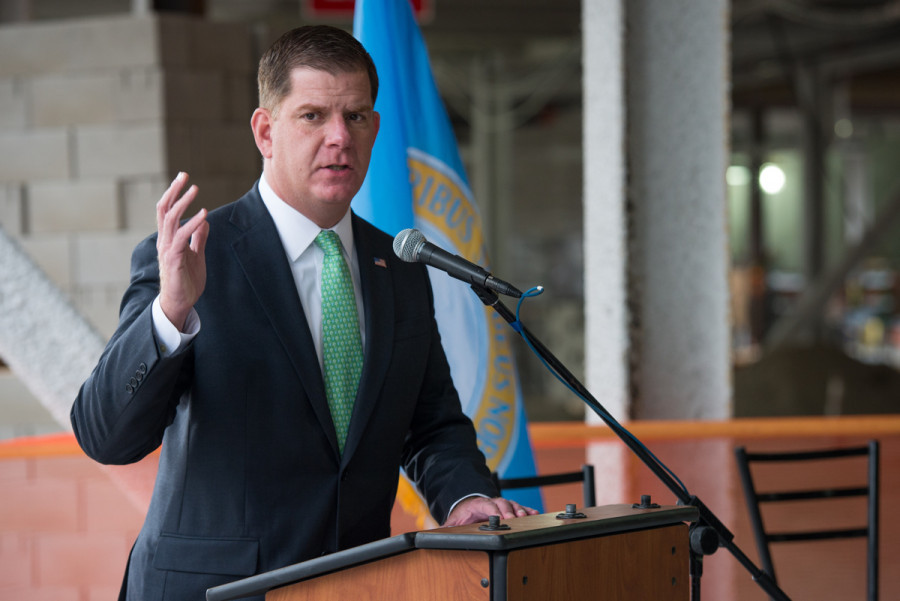Mayor Walsh’s Short-Term Rental Proposal Would Outlaw Investor-Owned Airbnbs
He sent a new plan to the City Council today.

Photo via Mayor’s Office/Jeremiah Robinson
Is the era of investor-owned Airbnbs, which Boston housing advocates say have contributed to rising rents and made a tight rental market even tighter, coming to an end?
A new proposal filed Wednesday by Mayor Marty Walsh would more or less end the practice, outlawing short-term rentals in cases where a property’s owner does not live in the building for at least 9 months out of the year.
According to the plan, people who want to buy up a unit and then use it exclusively as an Airbnb-style rental would have to convert it to a commercial, rather than residential, property. That would require them to appear before the Zoning Board of Appeal. It’s unlikely that many would choose to do so.
It would also require that Airbnb “hosts” first register with the city and pay an annual fee: $25 to rent out an in-unit bedroom, or $200 to rent out an entire unit. A live-in owner of a two- or three-family home would be allowed to use one of the secondary homes as a short-term rental for up to 120 nights a year, or rent out their own home an unlimited number of times, and would also pay a $200 annual fee.
Hosts would have to alert abutters within 30 days if they plan on renting out a room, and short-term rental companies like Airbnb would need to hand over information about where rooms are being rented, and how often, which Walsh said would help with enforcement of the new rules.
“Thoughtful regulation of short-term rentals that balance our efforts to preserve housing affordability with the growing demand for short-term rentals is key to keeping our communities stable,” Walsh said in a statement. “Boston is a great place to live and visit, and we look forward to responsibly incorporating the growth of the home-share industry into our work to create affordable housing options for all.”
The proposal will tee up another round of spirited debate about short-term rentals, which have exploded in popularity in Boston and around the world thanks to the rise of Airbnb. Some who use the app say it helps them earn extra cash by monetizing unused space in their homes, or gives them a cheap place to stay while traveling. Others, including Walsh and several city councilors, say the app and the industry that has sprung up around it has taken units off the market that could otherwise have been used by Bostonians who need an affordable place to live. They also point to a 2016 study from UMass Boston that showed Airbnb caused rents to inch upward.
City Councilors would have to sign off on the rules before they could take effect. Councilors Michelle Wu and Lydia Edwards have both said they support the proposal, which Wu said in a statement would “close corporate loopholes, protect our housing stock, and stabilize neighborhoods.”
Walsh filed a different short-term rental proposal with the City Council in January, but withdrew it three months later to hammer out more of the details.
Ever since, San Francisco-based Airbnb has been waging an aggressive messaging campaign in opposition to regulations deemed to restrictive. The company in recent weeks has bought radio ads, sent out email blasts targeting Councilor Wu and urging Airbnb users to write to city officials, and has even begun calling its users directly using in-app contact info.
“We are disappointed the city is pursuing an approach to home sharing rules that violates federal laws, harms middle class Bostonians, and doesn’t fully consider input from the thousands of families already using home sharing to pay the bills,” the company said in a statement Wednesday. “We believe there is a better path forward that creates enforceable rules to regulate the entire industry — similar to cities like Chicago, New Orleans, Seattle, among others — while protecting affordable housing and neighborhood quality of life.”
Walsh’s proposal does not include limits on how many nights a unit can be rented out on a short-term basis, which had been one of Airbnb’s major concerns.


